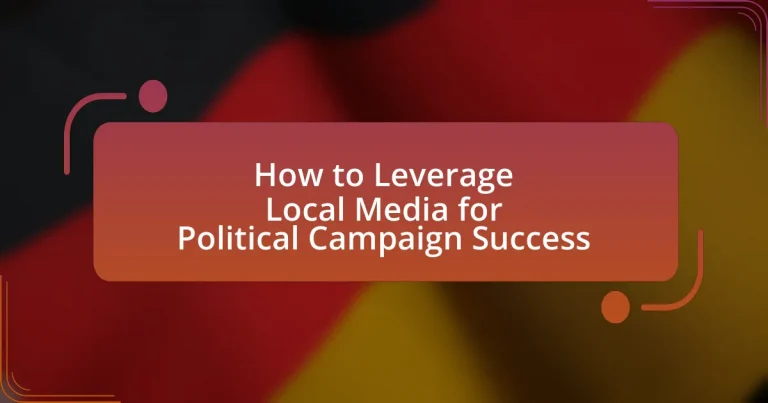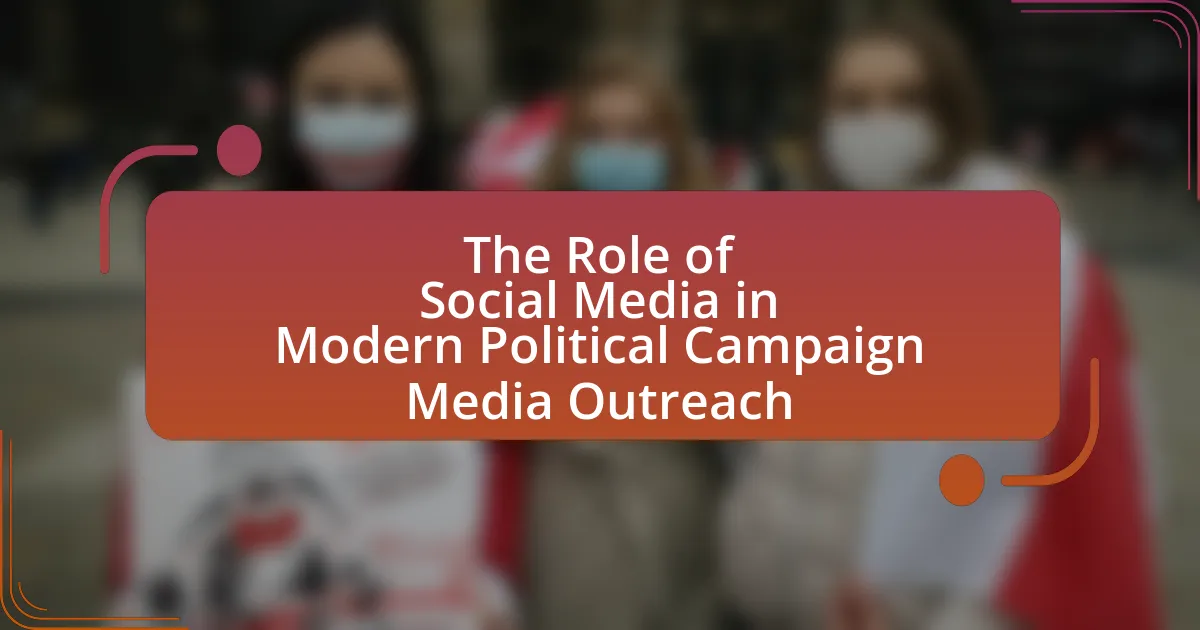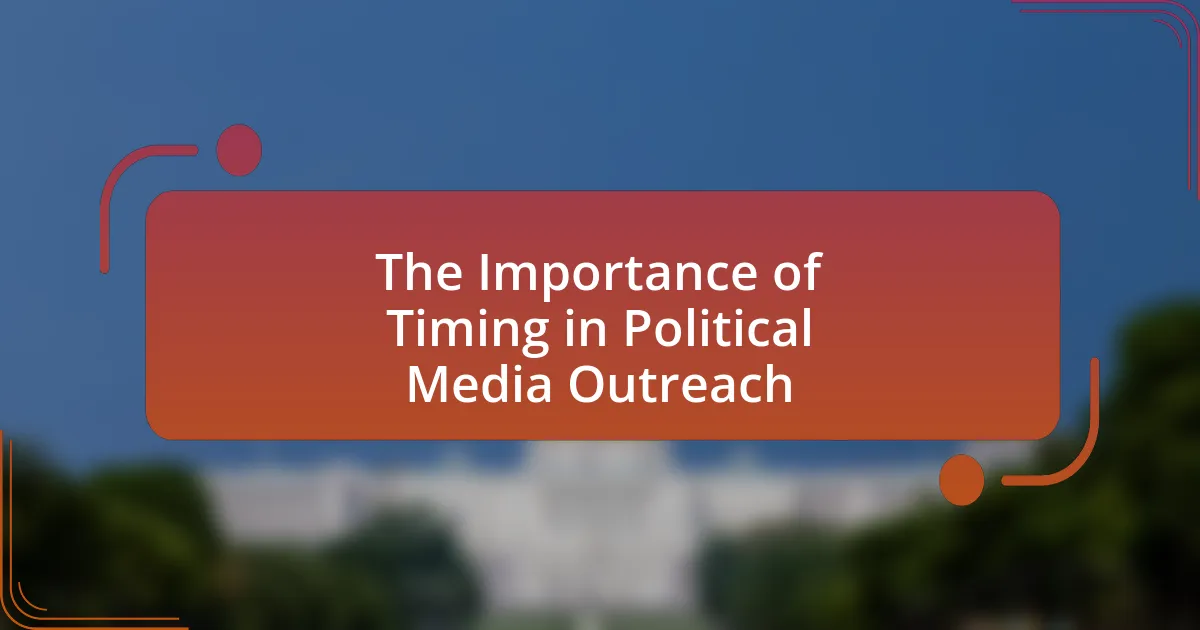The article focuses on the critical role of local media in enhancing political campaign success. It outlines how local media serves as a vital platform for candidates to communicate with voters, influence public perception, and increase voter turnout. Key topics include the impact of local newspapers, radio stations, and online platforms on shaping candidate images and reaching specific demographics. Additionally, the article discusses effective strategies for candidates to engage with local media, including building relationships with journalists, tailoring messages to community issues, and utilizing press releases. It emphasizes the importance of leveraging local media to foster trust and credibility, ultimately driving voter engagement and participation.
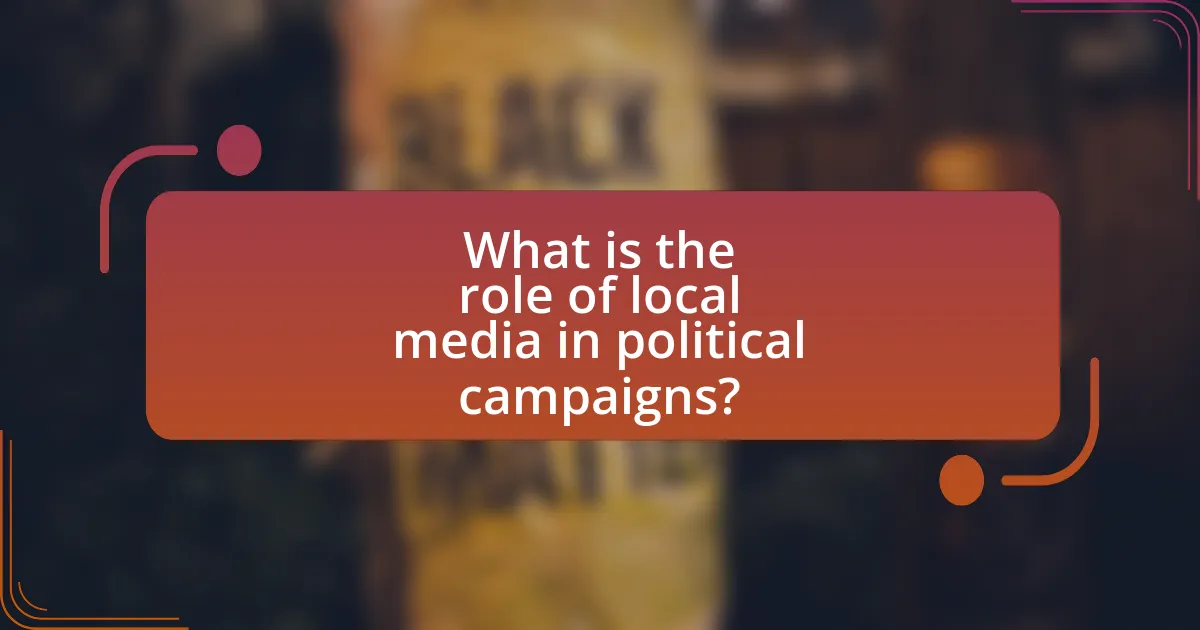
What is the role of local media in political campaigns?
Local media plays a crucial role in political campaigns by providing a platform for candidates to communicate their messages directly to the community. This media serves as a primary source of information for voters, influencing public opinion and shaping perceptions about candidates and their policies. Studies have shown that local news coverage can significantly impact voter turnout; for instance, a 2018 study published in the American Economic Journal found that increased local news coverage of elections correlates with higher voter participation rates. Additionally, local media often highlights community issues, allowing candidates to tailor their messages to resonate with constituents, thereby enhancing their relatability and appeal.
How can local media influence voter perception?
Local media can significantly influence voter perception by shaping narratives and providing information that frames political candidates and issues. Through targeted reporting, local media outlets can highlight specific aspects of a candidate’s platform, thereby affecting public opinion. For instance, studies have shown that local news coverage can sway voter attitudes by emphasizing particular issues that resonate with the community, such as education or public safety. Additionally, local media often serve as a primary source of information for voters, making their portrayal of candidates crucial in determining electoral outcomes. Research indicates that voters are more likely to trust local media sources, which can lead to increased credibility for the candidates they cover positively.
What types of local media are most impactful in political campaigns?
Local newspapers, radio stations, and community-focused online platforms are the most impactful types of local media in political campaigns. Local newspapers provide in-depth coverage and analysis of candidates and issues, influencing voter opinions significantly; for instance, a study by the Pew Research Center found that local news outlets are trusted sources for political information. Radio stations, particularly those with local talk shows, facilitate direct engagement with the community, allowing candidates to connect with voters in real-time. Additionally, community-focused online platforms, such as local blogs and social media groups, enable targeted outreach and grassroots mobilization, as evidenced by the success of campaigns that utilized these channels to engage younger voters.
How does local media coverage shape candidate image?
Local media coverage significantly shapes a candidate’s image by influencing public perception and framing narratives. When local media highlights specific issues, events, or statements made by a candidate, it can create a favorable or unfavorable impression among voters. For instance, studies have shown that candidates who receive positive local media coverage tend to experience increased support in polls, as local news often serves as a primary source of information for constituents. Furthermore, the tone and context of the coverage can reinforce or challenge a candidate’s messaging, impacting their overall reputation and electability.
Why is leveraging local media essential for campaign success?
Leveraging local media is essential for campaign success because it directly connects candidates with their target audience in a relevant and relatable manner. Local media outlets have established trust and credibility within their communities, which enhances the effectiveness of campaign messages. According to a study by the Pew Research Center, 70% of local news consumers believe that local news is important for understanding their community, indicating that campaigns utilizing local media can better engage voters. Additionally, local media coverage can amplify campaign visibility, as stories featured in these outlets often reach a dedicated audience that is more likely to participate in local elections.
What advantages does local media provide over national media?
Local media provides the advantage of tailored content that resonates more deeply with the community compared to national media. This localized focus allows for coverage of specific issues, events, and personalities that are directly relevant to the audience, fostering a stronger connection and engagement. According to a Pew Research Center study, local news outlets are more trusted by their communities, with 71% of respondents expressing confidence in local news compared to only 50% for national news. This trust enhances the effectiveness of political campaigns that utilize local media, as candidates can leverage this credibility to communicate their messages more effectively.
How can local media help in reaching specific voter demographics?
Local media can effectively reach specific voter demographics by tailoring content to resonate with the interests and concerns of those groups. For instance, local news outlets often have a deep understanding of community issues, allowing them to create targeted messaging that addresses local needs, such as education, healthcare, or public safety. Research indicates that 70% of voters trust local news more than national outlets, making local media a credible source for campaign information. Additionally, local media platforms can utilize demographic data to segment their audience, ensuring that political messages are delivered through the most effective channels, such as community radio, local newspapers, or social media groups specific to certain demographics. This targeted approach enhances voter engagement and increases the likelihood of turnout among those demographics.
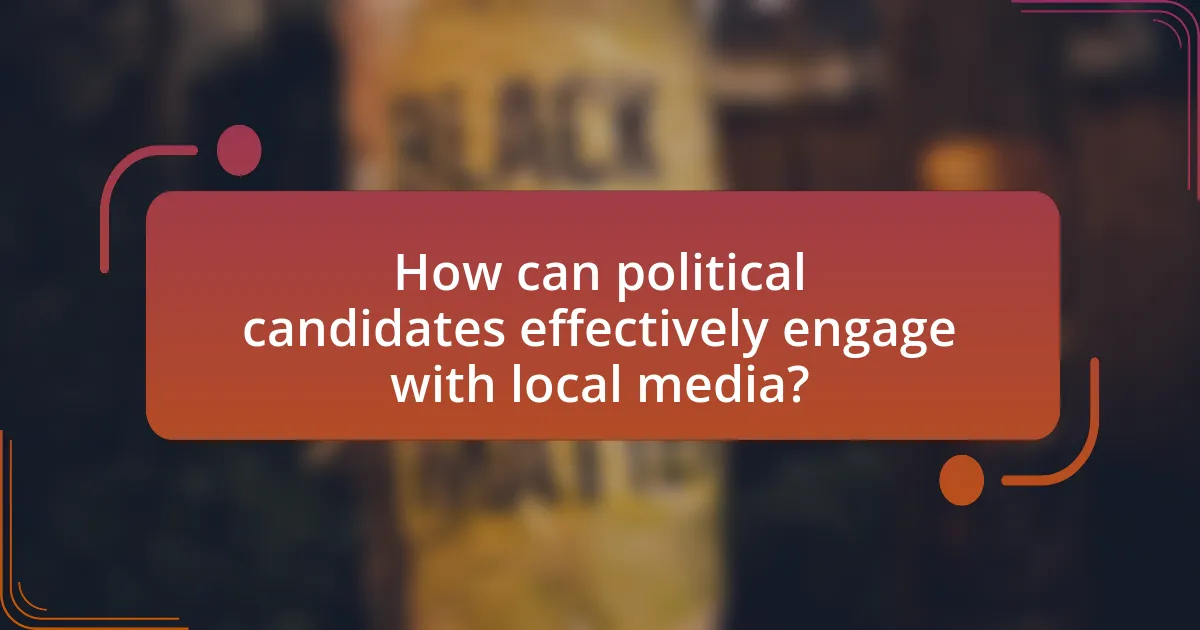
How can political candidates effectively engage with local media?
Political candidates can effectively engage with local media by establishing strong relationships with journalists and providing timely, relevant information. Building rapport with local reporters fosters trust and increases the likelihood of coverage. Candidates should proactively share press releases, organize press conferences, and offer exclusive interviews to create newsworthy content. According to a study by the Pew Research Center, 68% of local news outlets prioritize stories that are directly relevant to their communities, highlighting the importance of local relevance in media engagement. By tailoring their messages to address local issues and concerns, candidates can enhance their visibility and influence within the community.
What strategies can candidates use to build relationships with local journalists?
Candidates can build relationships with local journalists by engaging in consistent and transparent communication. Establishing regular contact through emails, phone calls, or social media interactions allows candidates to share newsworthy updates and insights, fostering a rapport with journalists. Additionally, candidates should invite journalists to campaign events, providing them with firsthand experiences and exclusive access to information. This approach not only enhances visibility but also demonstrates the candidate’s openness to media coverage. Research indicates that candidates who actively engage with local media are more likely to receive favorable coverage, as journalists appreciate accessible and cooperative sources.
How can candidates tailor their messages for local media outlets?
Candidates can tailor their messages for local media outlets by focusing on community-specific issues and utilizing local language and cultural references. This approach ensures that the message resonates with the audience, making it more relatable and impactful. For instance, candidates should research local concerns, such as education, public safety, or economic development, and incorporate these topics into their messaging. Additionally, using quotes from local leaders or statistics relevant to the community can enhance credibility and engagement. Studies show that localized content increases audience trust and interest, which is crucial for effective communication in political campaigns.
What are the best practices for conducting interviews with local media?
The best practices for conducting interviews with local media include thorough preparation, clear messaging, and engaging storytelling. Preparation involves researching the media outlet, understanding the audience, and anticipating questions. Clear messaging ensures that key points are communicated effectively, often using sound bites that resonate with the audience. Engaging storytelling captures attention and makes the message relatable, which is crucial in political campaigns. According to a study by the Pew Research Center, effective communication strategies significantly enhance public perception and engagement, highlighting the importance of these practices in media interactions.
How can candidates utilize press releases to gain media coverage?
Candidates can utilize press releases to gain media coverage by crafting clear, newsworthy announcements that highlight significant campaign events, policy positions, or endorsements. By distributing these press releases to local media outlets, candidates can attract attention and generate interest in their campaigns. For instance, a study by the Pew Research Center found that 73% of journalists consider press releases a valuable source of information for their stories, indicating that well-written releases can effectively reach and engage media professionals.
What key elements should be included in an effective press release?
An effective press release should include a compelling headline, a strong lead paragraph, relevant details, quotes from key stakeholders, and a clear call to action. The headline captures attention and summarizes the news, while the lead paragraph provides essential information, including the who, what, when, where, and why. Relevant details expand on the story, offering context and background information. Quotes from key stakeholders add credibility and a human element, making the release more engaging. Finally, a clear call to action guides the reader on what to do next, whether it’s attending an event or visiting a website for more information. These elements ensure that the press release is informative, engaging, and actionable, which is crucial for gaining media coverage and public interest in a political campaign.
How can timing affect the success of a press release?
Timing significantly affects the success of a press release by determining its relevance and visibility. A press release issued at a strategic moment, such as aligning with current events or industry trends, can capture greater media attention and audience interest. For instance, releasing information about a political campaign during a relevant news cycle, such as an election period or a significant local event, increases the likelihood of coverage. Research indicates that press releases sent on weekdays, particularly Tuesday through Thursday, receive higher engagement rates compared to those sent on weekends or Mondays, as journalists are more active during these times. Therefore, understanding and leveraging timing can enhance the effectiveness of a press release in achieving its intended impact.
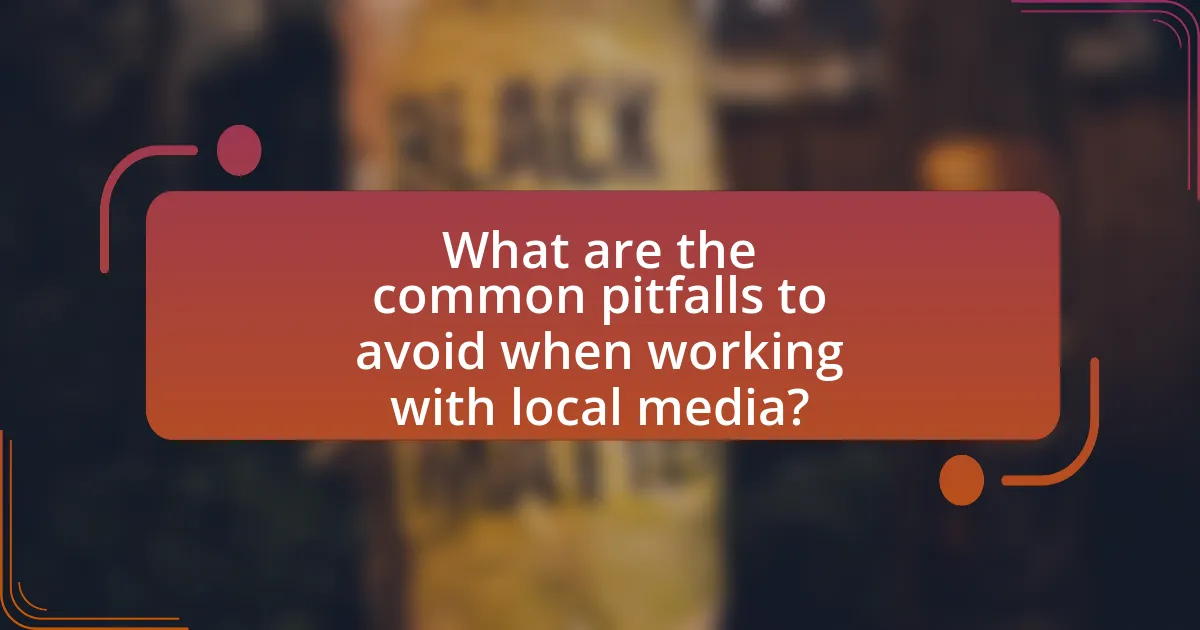
What are the common pitfalls to avoid when working with local media?
Common pitfalls to avoid when working with local media include failing to build relationships, neglecting to tailor messages, and underestimating the importance of follow-up. Building relationships with local journalists fosters trust and increases the likelihood of coverage. Tailoring messages to fit local interests ensures relevance and engagement, as local media often prioritize community-focused stories. Additionally, consistent follow-up after initial outreach can reinforce the campaign’s commitment and keep the story alive, as many local outlets operate on tight deadlines and may overlook initial pitches without reminders.
What mistakes can undermine a candidate’s relationship with local media?
Mistakes that can undermine a candidate’s relationship with local media include failing to communicate openly, being unresponsive to media inquiries, and not respecting deadlines. Open communication is crucial; candidates who withhold information or provide misleading statements can damage trust. Unresponsiveness to inquiries can lead to negative coverage, as journalists may seek information elsewhere, potentially portraying the candidate unfavorably. Additionally, not respecting deadlines can frustrate journalists, leading to missed opportunities for positive coverage and strained relationships. These behaviors can result in a lack of media support, which is essential for a successful political campaign.
How can candidates avoid miscommunication with journalists?
Candidates can avoid miscommunication with journalists by clearly articulating their messages and ensuring consistent messaging across all platforms. This involves preparing key talking points that are straightforward and easy to understand, which helps prevent misinterpretation. Additionally, candidates should establish a rapport with journalists by being accessible and responsive, fostering a relationship built on trust. Research indicates that effective communication strategies, such as media training, can significantly reduce the likelihood of miscommunication, as candidates learn to navigate interviews and respond to questions accurately.
What are the consequences of negative media coverage?
Negative media coverage can significantly damage a political campaign’s reputation and public perception. This type of coverage often leads to decreased voter support, as polls indicate that negative portrayals can sway public opinion against candidates, resulting in a loss of trust and credibility. For instance, a study by the Pew Research Center found that 62% of voters are influenced by negative news stories when forming opinions about candidates. Additionally, negative media coverage can lead to increased scrutiny from opponents and the public, further complicating a campaign’s messaging and strategy.
What are the best practices for leveraging local media in a political campaign?
The best practices for leveraging local media in a political campaign include building strong relationships with local journalists, tailoring messages to local issues, and utilizing multiple media platforms. Establishing connections with local journalists fosters trust and increases the likelihood of coverage, as journalists are more inclined to report on candidates they know personally. Tailoring campaign messages to address specific local concerns ensures relevance and resonates with the community, enhancing voter engagement. Additionally, utilizing various media platforms, such as newspapers, radio, and social media, maximizes outreach and allows for diverse audience engagement. These strategies are supported by studies indicating that local media significantly influences voter perceptions and turnout, making effective media engagement crucial for campaign success.
How can candidates measure the effectiveness of their media strategies?
Candidates can measure the effectiveness of their media strategies by analyzing key performance indicators (KPIs) such as engagement rates, reach, conversion rates, and audience feedback. For instance, tracking metrics like social media shares, comments, and likes provides insight into audience engagement, while website analytics can reveal how many visitors were driven by specific media campaigns. Additionally, conducting surveys or focus groups can gather qualitative data on voter perceptions and awareness, directly linking media efforts to voter behavior. This data-driven approach allows candidates to adjust their strategies in real-time, ensuring alignment with campaign goals and maximizing impact.
What tools can assist candidates in monitoring local media coverage?
Candidates can utilize media monitoring tools such as Meltwater, Cision, and Google Alerts to effectively track local media coverage. Meltwater offers comprehensive media intelligence services that allow candidates to monitor news articles, social media mentions, and broadcast coverage in real-time. Cision provides a robust platform for tracking media mentions and analyzing sentiment, which is crucial for understanding public perception. Google Alerts enables candidates to receive notifications about specific keywords related to their campaign, ensuring they stay updated on relevant local news. These tools collectively enhance a candidate’s ability to respond to media narratives and engage with their audience effectively.
